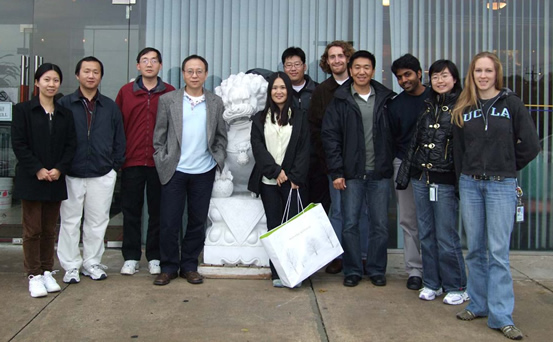| |
| |
| Bai Lu, Ph.D., Senior Investigator |
 |
Dr. Bai Lu received a B.S. degree from East China University and a Ph.D. degree from Cornell University Medical College in New York, where he studied neurotrophin gene expression. After postdoctoral training at Rockefeller University on the molecular mechanism of synaptic transmission and development, he became an assistant professor at Roche Institute of Molecular Biology. He joined NICHD, NIH in 1996, and is currently Chief of the Section on Neural Development and Plasticity. In 2004 he received a joint appointment at NIMH, and became the Associate Director of Molecular Neurobiology in the newly formed Gene, Cognition and Psychosis Program (GCAP). Dr. Lu received the Mathilde Solowey Award in 2003 for his research on the regulation of synaptic plasticity and learning and memory by neurotrophic factors. His laboratory is studying the molecular mechanisms by which neurotrophins regulate various forms of synapse development and plasticity. Recently, his laboratory launched a new line of research on genes involved in cognitive functions and schizophrenia using electrophysiological, behavioral, and imaging techniques.
|

|
Staff:

- Dr. Jay Chang, Ph.D., Postdoctoral Fellow jaychang@mail.nih.gov
- Mr. Evan Galloway, B.A., Predoctoral Fellow gallowaye@od.nih.gov
- Dr. Sundar Ganesan, Ph.D., Postdoctoral Fellow ganesansu@mail.nih.gov
- Dr. Yuanyuan Ji, Ph.D., Postdoctoral Fellow jiyuanyua@mail.nih.gov
- Dr. Yuan Lu, Ph.D., Postdoctoral Fellow luyuan@mail.nih.gov
- Miss. Fan Mei, Predoctoral Fellow meifan@mail.nih.gov
- Dr. Guhan Nagappan, Ph.D., Postdoctoral Fellow Nagappang@mail.nih.gov
- Dr. Kazuko Sakata, Ph.D., Research Fellow sakatak@mail.nih.gov
- Dr. Newton Woo, Ph.D., Postdoctoral Fellow woon@mail.nih.gov
- Dr. Feng Yang, M.D., Ph.D., Staff Scientist yangf@mail.nih.gov
- Mr. Kang Zheng, Predoctoral Fellow, (301) 451-0956 zkang@mail.nih.gov
Research Interests:
The goal of our research is to understand how neuronal communication at synapses is regulated. Specifically, we are interested in the regulation of synapse development by neurotrophic factors. Traditionally, neurotrophic factors are defined as secretory proteins that regulate neuronal survival and differentiation. Recent studies have established a new concept that neurotrophic factors also play important roles in synapse transmission and plasticity in both developing and adult nervous system. Two types of regulation have been discovered: acute modulation of synaptic transmission and plasticity, and long-term alteration of the structure and function of synapses. We were among the first to study the synaptic functions of neurotrophic factors. A combined molecular biological and electrophysiological techniques are employed to study the regulatory effects of neurotrophic factors on the synapses at the neuromuscular junction and in the central nervous system such as hippocampus. We have made two important discoveries. One is that brain-derived neurotrophic factor (BDNF) acutely facilitates hippocampal LTP, a cellular model for learning and memory. This is achieved, at least in part, by enhancing synaptic responses to high frequency, tetanic stimulation and facilitation of synaptic vesicle docking. The second is that BDNF and neurotrophin-3 (NT3) promotes the long-term maturation at developing neuromuscular junction (NMJ). Both structure and function of the NMJ are altered after prolonged exposure to the neurotrophins. Our recent work focuses on the molecular mechanisms underlying the acute and long-term neurotrophic regulation, and their relationships. Ongoing projects include: 1) neurotrophic regulation of long-lasting hippocampal synaptic plasticity, using transgenic/knockout mice; 2) biochemical and molecular study of activity-dependent modulation of BDNF receptor trafficking in hippocampal neurons; 3) molecular study of the signaling mechanisms for acute and long-term neurotrophic regulation, using Xenopus nerve-muscle system.
|
Selected Recent Publications:
J. An, K. Gharami, G. -Y. Liao, N. Woo, A. G. Lau, F. Vanevski, X. Fu, E. R. Torre, K. Jones, Y. Feng, B. Lu, B. Xu (InPress) Distinct role of long 3' UTR BDNF mRNA in spine morphology and synaptic plasticity in the apical dendrites of hippocampal pyramidal neurons, Cell .
K. Martinowich, H. Manji, and B. Lu (2007) New insights into BDNF function in depression and anxiety, Nature Neuroscience 10, 1089-1093.
Full Text/Abstract
X. Duan, J. H. Chang, S. Ge, R. L. Faulkner, J. Y. Kim, Y. Kitabatake, X. Liu, CH. Yang, J. D.Jordan, D. K. Ma, C. Y. Liu, S. Ganesan, HJ. Cheng, GL. Ming, B. Lu (co-corresponding author), and H. Song (2007) Disrupted-In-Schizophrenia 1 regulates development of newborn neurons in the adult brain, Cell 130, 1-13.
Full Text/Abstract
N. H. Woo, C. J. Siao P. T. Pang, H. K. Teng, T. A. Milner, B. L. Hempstead, and B. Lu (2005) ProBDNF/p75 NTR signaling is necessary for hippocampal long-term depression, Nature Neurosci. 8, 1069-1077.
Full Text/Abstract
B. Lu, N. H. Woo, and P. T. Pang (2005) Yin and Yang of neurotrophin regulation, Nature Review Neuroscience 8, 603-614.
Full Text/Abstract
P. T. Pang, H. K. Teng, N. Woo, E. Zaitsev, K. Sakata, S. Zhen, K. K. Teng, W.-H. Yung, B. L. Hempstead, and B. Lu (2004) Cleavage of ProBDNF by the tPA/plasmin is essential for long-term hippocampal plasticity, Science 306, 487-491.
Full Text/Abstract
M. F. Egan, M. Kojima, J. H. Callicott, T. E. Goldberg, B. S. Kolachana, E. Zaistev, A. Bertolino, B. Gold, D. Goldman, M. Dean, B. Lu, (co-corresponding author) and D. R. Weinberger (2003) A single nucleotide polymorphism in BDNF gene affects regulated secretion of BDNF and human memory and hippocampal function, Cell 112, 257-269.
Full Text/Abstract
All Selected Publications
Contact Information:
Dr. Bai Lu
Laboratory of Cellular and Synaptic Neurophysiology, NICHD
Porter Neuroscience Research Center
Building 35, Room 1C-1004
35 Convent Drive, MSC 3714
Bethesda, MD 20892-3714
Telephone: (301) 435-2970 (office),
(301) 496-1777 (fax)
Email: bailu@mail.nih.gov
|
|















